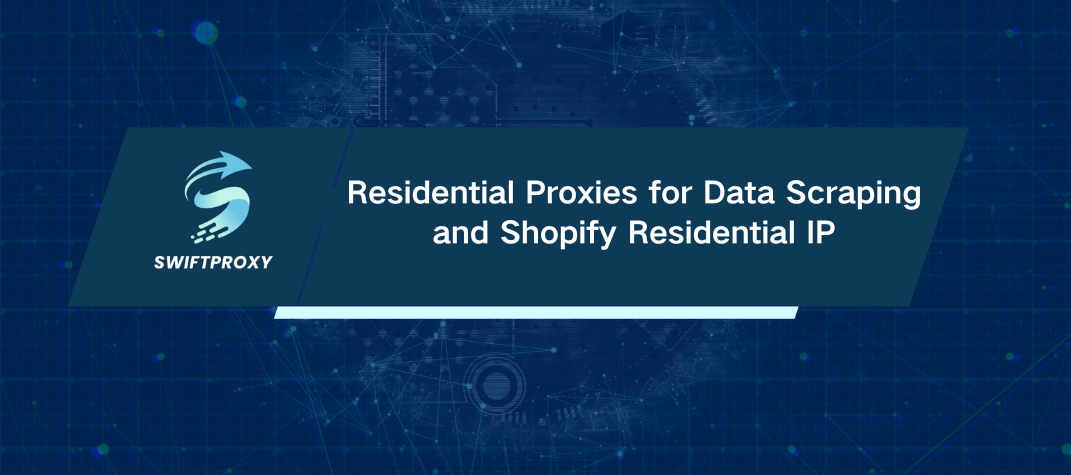Residential Proxies for Data Scraping and Shopify Residential IP

Residential proxies are one of the best-kept secrets for businesses needing anonymity online. These proxies come from real home IP addresses assigned by Internet Service Providers (ISPs), making them virtually indistinguishable from regular users. This realness means they're perfect for bypassing restrictions and blocks, ensuring smooth, undetectable browsing.
While the exact origin of residential proxies is a bit of a mystery, they've evolved as a crucial tool for businesses, from scraping web data to managing social media accounts. Let's dive into how they work, their benefits, and when you should consider using them.
The Magic of Residential IPs
A residential IP is a real IP assigned by an ISP to a home user. When you use a residential proxy, you essentially borrow that IP, making your online requests appear like they’re coming from a genuine home address, not a datacenter.
The Creation of Residential Proxy IP Addresses
Residential proxies are formed through partnerships. Users consent to lend their IPs in exchange for compensation—either financial or another form of value. The proxy provider then uses these IPs to build a network that others can tap into.
How Residential Proxies Function
A residential proxy sits between you and the website you're accessing. It forwards your requests to the target site, masking your actual IP with one from a residential location. Think of it as a disguise—your real identity remains hidden behind a legitimate residential IP. This makes it much harder for websites to detect or block you.
Why Use Residential Proxies
Residential proxies excel at dodging anti-bot and anti-scraping measures. They're also great for accessing content that's restricted by location. Some common uses include:
Data Scraping: Collect data from websites without getting blocked. Residential proxies bypass anti-scraping defenses.
SEO Tracking: Access search engine results and competitor data even when using automated tools.
Ad Validation: Ensure ads are displayed correctly and viewed by the right audiences without fraudulent traffic.
Social Media Management: Automate posting and data gathering without triggering platform bans.
Price Tracking: Track e-commerce prices without detection by using rotating IPs.
Secure Browsing: Browse anonymously, avoiding trackers and geo-restrictions.
Local Content Access: Unlock content restricted by region, thanks to geographically precise IPs.
Shopify Residential IP
For Shopify users, employing residential proxies can be a game changer. They allow you to monitor competitor pricing, gather data on product listings, and perform market research without triggering Shopify's protective measures. By appearing as a legitimate user, you can navigate the platform seamlessly, ensuring your access to vital information remains uninterrupted.
Rotating vs. Static Residential Proxies
Residential proxies come in two flavors—rotating and static. Each serves different needs:
Rotating Residential Proxies: Your IP changes with each request, providing unmatched anonymity. This is ideal for tasks like price monitoring or SEO scraping.
Static Residential Proxies: Your IP stays the same. Perfect for tasks that require consistent access to websites, like app testing or brand protection.
Dedicated vs. Shared Proxies
Dedicated Proxies: Exclusively yours, offering complete control and security. Use these when privacy is critical.
Shared Proxies: Multiple users share the same IPs, making them cheaper but less reliable. Best for lower-stakes activities like streaming.
SOCKS5 vs. HTTP/HTTPS Proxies
SOCKS5: A versatile and secure protocol that handles all kinds of traffic, making it great for high-traffic scraping.
HTTP/HTTPS: The standard protocol for browsing and web scraping. HTTPS is more secure, but SOCKS5 offers better speed and flexibility.
Methods for Getting Residential Proxies
You can either buy them from a provider or set up your own—though the latter requires serious technical know-how. Providers like Swiftproxy offer affordable, easy-to-use solutions that don’t require any technical setup. Once you've got your proxies, they're easy to integrate with your system or application.
Final Thoughts
The choice between residential and datacenter proxies comes down to your needs. If stealth, reliability, and location accuracy are priorities, residential proxies are your go-to. They might cost more, but the benefits far outweigh the costs when it comes to successfully navigating the complexities of the web.
Want to try it out? Swiftproxy offers residential proxies—no strings attached. Start small, test it out, and see the difference for yourself.

















































